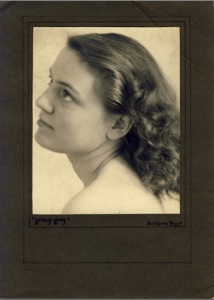Jeanne M Bennett 1919 - 2013


Mum was born in the shadow of Porchester Castle near Portsmouth in 1919.
This is abridged from her own account of her early life until she married.
My Mother bore me in Columbia Cottage in the village of Portchester. My Father was still in France, he had stayed on in France in the War Graves Commission to look for the body of his older brother (Cecil) [who had joined up on the same day, but in KRRC – and been killed the same day that “Father” was seriously injured.]. No luck. We also lived in a little black wooden cottage in the Castle grounds – our kitchen was part of the walls of the castle near the main gate. I well remember being watched across the road to run down the hedge to my Great Aunt’s home (Castle Cottage). She was Father’s aunt, & her husband “Uncle Tim” had been the schoolmaster, & they were married in the Church in the Castle grounds after he retired. I was Baptised there, as was my son.
Later, when father returned from the war, he returned to Banking & found a position in Lloyds Bank, Portsmouth, so we moved to a small flat in Waverley Road, Southsea. I can just remember this it was a semi-basement, & the toy box was in the hall near the front door! After a short time we moved to a house in St. Simon’s Road – No 37 known as ‘Lionel House’ because of 2 recumbent lions on top of the pillars. The house had steps up to the first floor & a side door down three steps to the side front door. It had bay windows to the 3 floors, with a bay round the attic bedrooms. We had three floors & two aunts – Madge & Meg - lived on the floor above the first floor (where the front door was). The Attic floor had 2 Bedrooms & a boxroom where the maid slept. We children slept in one of the attics & Uncle Will father’s cousin who lived with us had the other rooms. On the “mezzanine floor” were cupboards for tanks & linen! The next floor was the aunts’ flat – a living room, a bedroom & a kitchen over the Hall. I remember coming in with the aunts shopping one day & finding the curtains alight! Which fire I put out & then had hysterics! They shared our bathroom & loo on the next small mezzanine; down the stairs to the main hall where we had a drawing room at the front & the parents bedroom at the back – for a long time the little room under the bathroom was Uncle’s. Then again down the back stairs to the “nether region”, the semi-basement – coal hole under the front steps – dining room under the drawing room at the front & a huge kitchen at the back with a pantry & a scullery. It was a real family kitchen with lovely smells. The big wash went out every Monday & Mummy & maid did the “smalls” in the scullery with its stone sink, copper & mangle. There was an outside loo in the back garden. We had a swing in the garden & for a short time I remember a chicken coop! St Simon’s Church was across the road & I went there all my “Southsea” life.
I went to “Dame School” to begin with & walked there & back every day – alone at 5 & 6! We had a good grounding in the 3 Rs! & Geography & a little P.T. Later I went to a private school called St Hildred’s & there I had my first uniform. At 11 I went to Portsmouth High School at my own request & never regretted it. I wasn’t a brilliant student, but at least got my equivalent of GCSEs & had part of another year in 6th form before Father found me a job in the Bank. I had already had lessons in shorthand & typewriting – also totting & business methods. I was a Girl Guide at St Simon’s, & later a Ranger. We had a good group of young people at Church as we all grew up together & I am still in touch with friends of those days. Holidays were mostly spent on farms – Father would have liked to be a farmer, but there was no place for him in the family farm, which he loved.
In the summer we used to go on a little steamer from S. Parade Pier [Southsea] to Seaview on the I.O.W. I could always swim like a fish – the water & tennis filled my free time. One Sunday coming back, my sister Betty had fallen – fully dressed – into the sea, so when we got on board the Princessa she was taken to the boiler house & dried off!
Father took me out in a little rowing boat in the “race” of Langstone Harbour & taught me to fish. I shall never forget the taste of fish I had caught, whiting, pout & little dabs fried that night by mummy for supper.
Eventually, in 1950, we were able to move out to Aden to join Dad. Mum, yet again, threw herself into her role of housewife, mother, Padre’s help & support, actress, etc. Where she found the energy is hard to imagine. Christine arrived in January 1951. There was more than enough milk for her, so Mum helped out with some twins that were born at the same time, whose mother was less able to feed them; Mum was very proud of that. We lived out at Sheik Othman, remote from RAF Khormaksar so Mum had to be quite self-sufficient – no telephone & she hadn’t a car and couldn’t drive anyway.
Following his tour in Aden, Dad was posted to RAF St Athan in South Wales. Yet again, there was no accommodation so we lived in Southsea until a hiring became available in Barry Dock. We lived there for a while until, at last, a quarter became available at St Athan itself. Mum and Dad were, by this time, well into what are now known as the Whitehall Farces – ‘Rookery Nook’, ‘Tons of Money’, ‘Women Aren’t Angels’, ‘See How They Run’ etc. Of course, Mum would be there learning parts, helping with costumes, keeping everyone supplied with her baking. Additionally, she’d be involved with all the church activities.
At the end of 1954, after St Athan, Dad moved to RAF Laarbruch, a brand new base in Germany. He had to be there for the troops’ Christmas while we stayed behind in South Wales. However, this time we joined him relatively quickly in early 1955 and moved into a house so new that the plaster was damp, road unfinished and felled trees in the garden.
Again, everything to do with the Church filled their lives, yet they still found time for shows and plays, BFN broadcasts and caring for their parishioners. In one play, ‘See How They Run’, Dad played the part of Clive, an AWOL Private, while Mum played the vicar’s wife. In one scene, Dad comes in to see his ex-girlfriend (Mum) and exclaims, “What? You, a vicar’s wife!” No more than mildly funny in the plot of the play but, in the circumstances, it brought the house down.
Mum was not going to let Dad’s death reduce her church life. Following Dad’s death and with their knowledge of Mum & Dad, the Diocese were encouraged to approach Mum to be a Reader.
She started on the course to become a Licensed Reader and was Licensed at Southwell in September 1984.
Mum also involved herself in the life of Ordsall parish becoming a stalwart member of the choir.
She also joined a parish trip to the Oberammergau Passion Play in 1990 and treated all of her family who wished to go, too. From 1981 through to 2000, not being one to sit at home doing nothing, Mum had holidays in Denmark, river-cruising in Russia & Poland, Holy Land pilgrimage twice, “In the Steps of St Paul” (incl. Greece & Turkey), Egypt, Malta, and the USA.
Christmas was wonderful in St. Simon’s Road, the puddings were made in early October & we all had jobs to do – stone the raisins, shred the fresh suet, chop the peel – (wasn’t the sugar tasty) – make breadcrumbs, & then in the great brown stone jar (bread bin) was the mixture to stir – everyone, but everyone had to have a stir & wish. Then the mixture went into the basins including our 2 metal ones & boiled all night, with the alarm set so that the pans could be topped up with boiling water. The metal ones were for mummy’s two brothers in India, one in Lucknow who worked for the Maharajah of Balrampore [possibly: Sir Bhagwati Prasad Singh (1879-1921) Maharajah of Balrampur, Knight …or, possibly: Maharaja Sir Patshwari Prasad Singh of Balrampur, married 1932.], & one in the army in Calcutta, - he was married with one daughter, who came to us for holidays. When they came on Furlough they always came to us. There wasn’t a great deal of money in our house, but everyone helped & we managed. Father was very keen on tennis & we had a grass court, & I played as soon as I could hold a racquet! I actually played for P.H.S. though not the top class!
Talking of P.H.S. – I was one of Miss Cossey & Miss Watts “Young Ladies” as we were called – I went to P.H.S. just in time for the 75th (?) celebrations.
St Mary’s, Portchester Castle
About Jeanne
Born Oct 1919 Portchester
Portsmouth High School
Married Oct 1941
1980 widowed
Died Mar 2013
Retford
One son and two daughters.
Eight grandchildren.
Six great-grandchildren, two step-great-granddaughters and a step-great-grandson.
Mum had always been involved in Guiding and enjoyed full participation as guider through to young-adult levels. She held Divisional and District Commissioner ranks at various times throughout her life with Dad.
Unfortunately, Dad exhausted himself in Christmas Island and was hospitalised in Hawaii for a spell. This extended his tour to 11 months separation after which, in 1960, he was posted to RAF Wittering. Again, he overloaded himself and then spent time in hospital at RAF Halton and recuperating at RAF Headley Court. Once again, Mum was left “holding the fort”.
In Laarbruch Mum was asked to become Guiding District Commissioner. It was from Laarbruch that Shirley and David were sent off to boarding school for the sake of their education.
A programme from another production, Dec 12th & 13th, 1955, at RAF Laarbruch. Jeanne played the rôle of Thelma Bandle in the play and Stanley was the producer.
I have this image, thanks to the kindness of “S.A.C. M. A. Clayton”, who played the rôle of Alfred Bandle, Thelma’s husband.
In 1949, at the end of his tour at Cosford, Dad was posted to RAF Khormaksar in what was then Aden, now Yemen. This meant a long separation for Mum & Dad as there was no accommodation available for us at first. Mum & Dad had bought a house in Southsea so the three of them moved there for almost 18 months. You couldn’t grab an aircraft for a quick holiday visit, it was a 3 week troopship journey from UK to Aden via Gibraltar, Malta, Alexandria, Port Said & Port Suez. All contact was by letter as telephones were few and far between and international calls were expensive, rationed and had to be pre-booked.
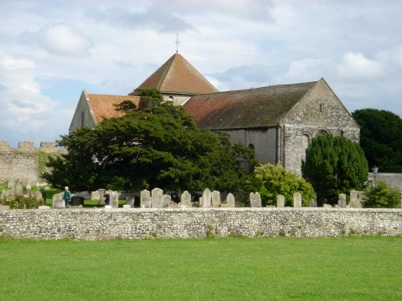
This text is based on the longer tribute prepared for JMB’s funeral, but delivered in an abbreviated form during the service.
Mummy taught me all the “wifely” things – dress making, cooking & mending – silver polishing & so on. These I have used all my life. The aunts taught me to knit & embroider.
To my great sorrow, for Mummy was the centre of our life, she died when I was 15, and for two years I had to help more, though the “aunts” took over the running of the home. I did my best when the aunts left, but my younger sister, “Betty”, & still younger brother “Robert” thought I was too bossy! We still had a maid, but I had to cook & help with the house.
Then Father decided to marry Gladys – who had worked in the same office of the Bank. She had set out to hook him (!!), but did not want the children! So life wasn’t much fun. I was out of favour because I knew too much about cookery & running the house & Daddy’s likes & dislikes, and although they blamed me for the discord – it wasn’t my fault – I did try very hard to tell her how Daddy liked things but she wouldn’t even listen, so I left home as soon as I was 21.
I had met Stanley by then – he had come to stay with our Curate, after ’flu at College – St John’s Hall, Highbury. [She has missed out an oft-told tale of how the local Curate once gave her some chocolates but omitted to mention they were actually from SGB, not himself!] Stanley had started to train as a pharmacist, in order to work with his step-Father; & when Mr Billington died, Stanley decided to follow George (his brother) into the Church & got a place at St John’s Hall, Highbury. He kept on writing to me from there during the next 2 1/2 years & when he passed out with 1st Class Honours (top) and won the “Early Church” History prize, he went to St. Lawrence, Foleshill.
As soon as I was 21, I left home, & asked the Bank where I worked, to move me to Coventry. I could not have a house in Foleshill, & so I found digs on the other side of the Town. We used to cycle back and forth – poor Stanley did miles to accompany me home at night! As soon as Stanley had done the compulsory year’s service as a curate, we were married in Foleshill Church, with all the furniture put back for our Wedding (it had been bombed and was empty!) & then whisked out again by another door whilst our photographs were being taken! The Parish provided the “banquet”; & being all homemade it was lovely. I borrowed my wedding dress – from Margaret Bennett – George’s wife, & it fitted me perfectly! We had found a small house near the Church, and in spite of the sirens, & bombs, we were very happy
This is where her account ends.
Once Mum & Dad were married, Mum involved herself wholeheartedly in Dad’s ministry as she did for the rest of his life.
Whist they made home initially in Foleshill, It was not long till they moved to Fareham and then Portsmouth. This was still during the war, so “buzz-bombs” were still coming over, as were conventional raids, to hit Portsmouth. During this time, David was born but Mum was still supporting Dad with his ministry. They organised a concert party (along the lines of ENSA) called “The Pompeydours”, a play on Pompey (the nickname of Portsmouth), who toured the local area, entertaining the troops and hospital patients to keep up morale.
Whilst at Foleshill, Dad was Officiating Chaplain to the Balloon Barrage. He continued the role at Titchfield (from Fareham). This was his introduction to the RAF.
They lived in Nelson Lodge, Nelson Road (appropriate for someone born on Trafalgar Day). At the end of the war, just over a month after VE Day, Shirley was born there – now Mum had to care for two very young children and yet still found time to support Dad.
Dad had wanted to join the RAF during the war. However, the bishop would not release him but, once the war was over, Dad took the opportunity to join up and was commissioned in July 1947 as a Student Officer. This was the real start of Mum’s travels and new experiences.
Dad had, of course, to go off for training so Mum was left on her own with two young children. In Feb 1948, once his training was complete, Dad was fully commissioned (initially on a Short Service Commission but subsequently on a Permanent Commission) and Mum & Dad moved to the village of Beckbury near Bridgenorth while Dad was Padre at RAF Cosford. They also organised a performance of ‘Midsummer Night’s Dream’ in the grounds of the Manor House, in part of which we were quartered.
David remembers Mum taking him to whist drives to introduce him into the iniquities of card playing. He very quickly had to learn how to keep track of which cards had been played.
Camping trips all over Germany and Austria comprised our main holidays so there was no rest for Mum who, inevitably, had to do the cooking.
When Dad’s tour at Laarbruch ended, he was posted to RAF Halton, near Wendover. We moved straight into a married quarter so were not separated this time. Again, church, concerts and plays filled their days. Shirley and David were away at boarding school during term-time, so a bit of pressure was lifted from Mum. This enabled her to do even more in support of Dad.
You may remember (above) that Mum failed her School Certificate German when at school. Well, at the age of 40, she decided to remedy that and took & passed her “O” Level German. Additionally, as Dad was going to be posted to Christmas Island, she had to learn to drive. This she did and passed her test first time. For a beginner, driving was not easy for her – the family car was left-hand drive!
Now came another long separation; in 1959, Dad was posted to RAF Christmas Island in the Pacific; for 9 months unaccompanied. Dad had been promised that we could remain in the quarter at Halton but, after he had gone, this was rescinded and we had to move into transit quarters at RAF Hucknall near Nottingham. Mum had to sort out that move on her own - along with a primary school child (Christine). It was while we were at Hucknall that Mum had to deal with Shirley being seriously ill and that the boarding house at St Alban's High School was closing. She had to find a new secondary boarding school for Shirley, with only a year to go before her 'O'-levels, so Shirley found herself at Lincoln High School. Mum really was on her own with the only communication being by air-mail.
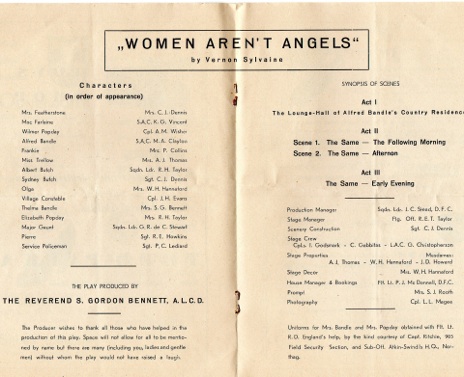
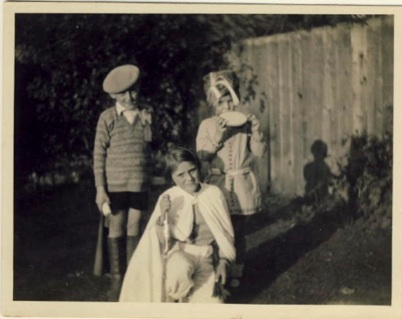
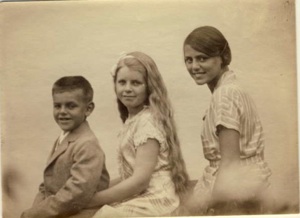
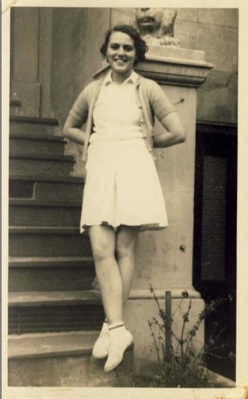
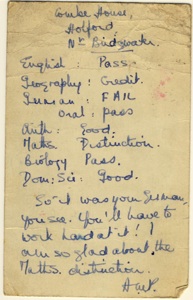
Evidence of the sympathetic thread running between Mum and Dad … Christmas 1959 at Hucknall, without Dad: Mum had bought Christine a Christmas gift, and then Dad's parcel for Christine arrived from Christmas Island. Mum looked at its size and shape, felt its weight, and turned it over and over and over… and opened it. Dad had bought exactly the same gift for Christine as Mum had, herself: a Viewmaster (with 3-D slides of flora and fauna of Hawaii). Mum was very relieved to be able to exchange the Viewmaster she had bought, for some extra slides!
Mum would drive (alone) from Cologne to Ostend and back, to collect Christine (now at boarding school) from the ferry for school holidays – or to and from Dusseldorf if Christine flew in.
After this, he was given a “rest tour” at RAF Newton (between Nottingham & Grantham). Rest Tour? Not Dad!! Mum found herself in the same hectic life of the Padre’s wife, church activities, shows, sports etc. Her greatest task was to keep a lid on Dad’s exuberance. David joined the RAF at this time – one “off their hands”!
Dad’s next posting was to Butzweilerhof in Cologne. They moved to a quarter in the Volkspark on the south side of the city. There we made lifelong friends with Pastor Gunther Karstedt and his family. Members of our family attended their daughter’s wedding in Cologne, as well as her mother, Frau Karstedt’s, funeral. Some years later, the son and daughter, with their respective spouses, travelled over to attend Christine’s wedding and Stanley’s funeral.
It was while they were in Cologne that she discovered that she could sing in a choir, and continued thereafter as a fine alto.
Mum also won her Gold Badge for donating over 100 pints of blood – no mean achievement considering motherhood with 3 children and moving all over the world with Dad.
Next, Dad was posted to RAF Watton in Norfolk. Initially, Mum & Dad had a transit quarter at RAF Honnington but, after about 6 months, moved onto base at Watton. Mum remarked that she’d had more moves than years of marriage! One Officers’ Mess event, there, was a Roaring Twenties night. Mum made herself – and helped Christine to make herself – a couple of “flapper” dresses: still very short for the day, but she would always join in wholeheartedly.
Dad’s final posting was RAF Catterick.
Mum & Dad organised a party in the Mess to say “We’ve arrived!”. They had the dance section of the RAF Regiment band to play. The band members all turned up with what they perceived to be dog-collars. They’d turned ordinary detached collars back-to-front and asked “How on earth do you put these on?”
Mum & Dad, having been through the "joys" of postings’ separations, took in David’s wife and two young daughters at the Rectory while he did courses & then went out to Germany: not the easiest thing to do when you thought you were well past the days of tiny children! It was about 6 months before Mum could say farewell to the threesome when they joined him in Germany.
Christine was at University at that time, and didn’t really know anyone in the area when she came home, so Mum and Dad organised a New Year’s Day party at quite short notice. Lots of young people from the area were invited along – and came. I’m not sure who was responsible for making the punch, but Christine suspects it was Mum, and recalls people suggesting it was more of a “left hook” than a mere “punch”! (This may have had something to do with the whole bottle of brandy that was poured into it!)
In 1970 Dad retired from the Air Force and formed the Priory Cross Group of parishes (Fincham – where they lived - Boughton, Wereham, W Dereham, Shouldham, Shouldham Thorpe, & Marham)
At Fincham Mum understood how important it was that each parish in the newly-formed Group should be respected, so she would split up her collection: every parish saw the Rector's wife putting money in their collection.
At Dad’s memorial service, a senior person from Ely told how he had had some problems at his work and needed to “get away”. To paraphrase him: He arrived on the vicarage doorstep, virtually unannounced. The Priory Cross Group had finished evensong some 30 minutes earlier and Mum & Dad had earned an evening’s peace & quiet but his welcome that evening he would never forget. It was unobtrusive, it was undemanding, it was unquestioning. He had arrived on their doorstep, needing shelter. The strength of Dad’s flat hand shake, the comfort of Mum’s cup of tea gave all the shelter that was needed. There were no questions, just tranquillity. To a soul in need they gave succour.
In 1978 Mum and Dad moved to Gamston which was joined with Eaton and West Drayton.
It was when they were at Gamston Rectory that our Granddad and his wife came to live with Mum & Dad. His wife was in the first stages of dementia, but we didn’t understand that at the time. It made it very difficult, since explanations about why something was better done, or not done, or done differently, didn’t really work – and we found it hard to understand why. Mum coped, but found it very difficult.
For a while in late 1979 and early 1980, it was noticeable that Dad did not have the energy he had normally. About Easter time, 1980, Dad started to get a lot of pain and a swelling at his right temple. Mum was very concerned and arranged an appointment with a friend who was a Consultant. This was fitted in between other people’s appointments. The Consultant called Mum in and told her it was serious and critical. In a short time Dad was in hospital and died on 1st June (Trinity Sunday).
This left Mum in a tied house. She didn’t fold. She buckled down and found a house in Retford, got it sorted to move in, in January 1981. She was considerate enough, and had enough foresight, to choose a place which was near enough to remain within range of her friends, and far enough away not to be an embarrassment to the next incumbent; a place that was within range of facilities as she as getting older, and that was also accessible to transport links.
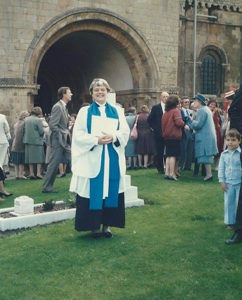
My own memories include: a succession of (usually beautiful) home-made clothes - including childhood smocked gingham summer dresses, and my first ever full-length evening dress; a good cook (leaving me handicapped with the feeling that shop-bought cakes, jams, preserves, chutneys... were not something to buy).
Although her early married life had been very hand-to-mouth, and with the added experience of wartime rationing to encourage her to be “careful” with money, she would always offer us (in a manner that made it clear we were to accept!) a substantial contribution toward our petrol costs whenever we travelled up to see her.
Mum, travelled out from the UK to attend the ordination to the priesthood of a young Deacon, Matthias, (now Bishop of Ho, in Ghana), who'd trained in Ordsall. Because of her effort, Bishop Okine (as he was then) invited her back, personally, to his enthronement as Archbishop of West Africa - for which she travelled out, again. On those visits she also visited Simon Ablorh, who was Archdeacon at the time. While there, she helped with the financing of clean water supplies to the more remote places she visited. She continued to send donations after her last visit.
Mum was very generous to her family giving financial and other practical support whenever it was needed.
That was Jeanne: a multifaceted woman of diverse skills - Mother to David, Shirley, and Christine; Grandmother to Sarah, Kath & Fran; Scott, Mandy & Jonathan; and Paul & Martin; Great Grandmother to Alex & Eleri, Tom & Emily, Jenni & Mike, Kerry & Rachel, and Ed.
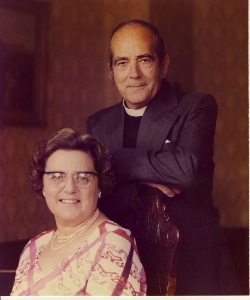
This tribute is largely based on the tribute prepared and delivered by David Bennett at Jeanne’s funeral.
all content on this web page © C M C, except where otherwise stated.
PLEASE NOTE - THIS WEBSITE IS IN DEVELOPMENT
